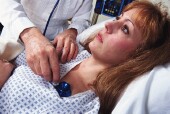 |
 |
 |

Women With Heart Attack Symptoms See Delays in Care
Differences in initial symptoms could explain discrepancy, study suggests|
|
HealthDay
Tuesday, January 13, 2009
 TUESDAY, Jan. 13 (HealthDay News) -- Women calling 911 with cardiac symptoms took longer than men to get to the hospital after an emergency medical services team had arrived in response to the call, a new study found.
TUESDAY, Jan. 13 (HealthDay News) -- Women calling 911 with cardiac symptoms took longer than men to get to the hospital after an emergency medical services team had arrived in response to the call, a new study found.
It's not clear why this was the case, but a number of gender differences exist when it comes to heart attacks. In particular, differences in initial symptoms could explain much of this delay, said the authors of the study, which appears in the Jan. 14 issue of Circulation: Cardiovascular Quality and Outcomes.
"Our data didn't reveal why women were delayed or what happened after, [but] other research suggests that heart conditions in women have a broader spectrum [of symptoms] than men," said study author Thomas Concannon, an assistant professor of medicine at the Institute for Clinical Research and Health Policy Studies at Tufts Medical Center in Boston. "The patient could not be recognizing the symptoms, and also the clinician."
Concannon said that "future research is absolutely needed to explore delays of this nature, and why they're happening."
Heart disease is the No. 1 killer of women, but many women and even some doctors aren't aware of this. As a result, women often don't recognize a heart attack when they're having one.
"Many symptoms are atypical -- back pain, jaw pain, bilateral arm pain, profuse sweating, nausea and vomiting," said Dr. Daniel I. Simon, director of the Harrington-McLaughlin Heart & Vascular Institute at University Hospitals Case Medical Center in Cleveland. "If someone calls EMS and says they have nausea and vomiting, that's roll-the-eyes-you-have-gastroenteritis, not a heart attack. They're not put on that STEMI [ST segment elevated myocardial infarction] highway, so to speak."
STEMI heart attacks are caused by blocked blood flow to the heart and generally result in more damage than non-STEMI heart attacks. STEMI heart attacks show irregularities on an electrocardiogram and are fast-tracked in a hospital emergency room.
About a quarter of patients with chest pain and half of those with heart attacks get to the hospital via EMS (emergency medical services), yet little is known about the timing of this journey.
The authors studied 5,887 calls made by people with suspected cardiac symptoms to EMS in 10 municipalities involving 29 hospitals and 98 EMS depots in Dallas County, Texas, in 2004. People with the symptoms were equally divided between men and women; half were white.
Women took an average of 2.3 minutes longer to get to the hospital than men, not considered a critical difference.
One expert agreed that difference was minimal.
"I'm not sure there's much here. It's a study from what happened five years ago in one place," said Dr. Robert Greenberg, an assistant professor of emergency medicine at Texas A&M Health Science Center College of Medicine and vice chairman of emergency medicine at Scott & White in Temple. "When you cut to the bottom line, they're talking about a two-minute difference and that's not going to make any difference in patient care. The question would be why."
But about 11 percent of patients were delayed by 15 minutes or more, a window that could be critical. And women were 52 percent more likely than men to be delayed at least this long, regardless of other factors, including the demographics of the neighborhoods.
"We chose 15 minutes before even looking at the data set because clinical evidence suggests that if you are having a heart attack, 15 minutes is enough to cause significantly more cell death," Concannon said.
Gender-specific differences in cardiac symptoms could have other, far-reaching effects, an accompanying editorial stated. For instance, EMS personnel might need more time to diagnose the problem while on the scene.
And, if the onset of a heart attack was not recognized immediately, the EMS staff might not use sirens and lights, which have been linked to an increase in ambulance crashes.
Or, on an entirely different note, women in the study might have chosen hospitals farther away, the editorial pointed out. The researchers also found that the chances of being delayed were increased 9 to 46 percent for each additional mile traveled. Also, traveling during evening rush hour doubled delay times, and forgoing a closer hospital for a more distant one raised the odds 81 percent.
But, as Simon stressed, women also need to pay attention to their symptoms.
"If you're perimenopausal and have a risk factor and atypical symptoms, you need to be aware this could be a [heart attack]," Simon said. "Most people with nausea and vomiting will have gastroenteritis, but if you miss a heart attack, that's not acceptable."
HealthDay
Copyright (c) 2009 ScoutNews, LLC. All rights reserved.
Related News:
- More News on Emergency Medical Services
- More News on Heart Attack
- More News on Heart Disease in Women
More News on this Date
Related MedlinePlus Pages:
| Home | Health Topics | Drugs & Supplements | Encyclopedia | Dictionary | News | Directories | Other Resources | |
| Disclaimers | Copyright | Privacy | Accessibility | Quality Guidelines U.S. National Library of Medicine, 8600 Rockville Pike, Bethesda, MD 20894 National Institutes of Health | Department of Health & Human Services |
Date last updated: 14 January 2009 |




